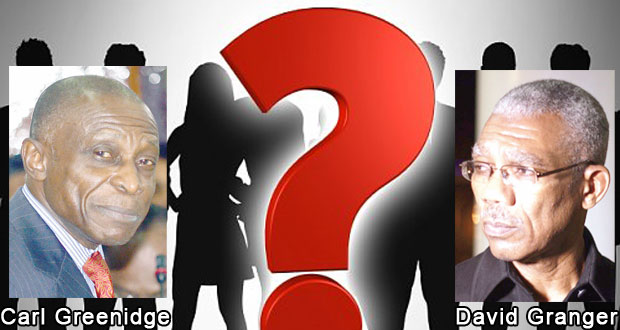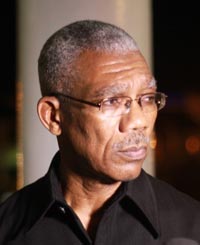
Who is at the helm of the APNU leadership?
- certain developments indicate possible dissent in the APNU ranks
SEARCHING questions have been raised regarding the dynamism of the APNU leadership following statements made by that coalition’s Shadow Finance Minister, Mr Carl Greenidge, with regard to the review of the Anti-Money Laundering and Countering the Financing of Terrorism (AML/CFT) Bill; as well as on the invitation extended by Finance Minister Dr. Ashni Singh for consultations on the 2014 Budget.
Granger’s flip-flopping has been noticeable in the last few months with regard to these two major national issues.
BLATANT LIE
As early as January 18, Granger had said that the combined Opposition had not been adequately consulted on the 2014 budget. “We have to be given that information…the Government is playing a very dangerous game in denying us the ability to contribute fully to the process,” Granger had said, even as he maintained that his party was being sidelined from consultations.
At that point he had added that Greenidge had been asked to engage the Government on the 2014 Budget talks. The fallacy in his comment was called when Dr. Singh issued a statement
the following day, pointing out that his invitation to the APNU coalition for budget consultations has been met with “stony” silence.
In a statement, the Finance Minister had said, “My most recent email, dated January 13, 2014, indicated Government’s invitation to meet on Budget 2014, and requested Mr. Greenidge to suggest a date during the past or coming week.
“The email was also copied to Messrs. David Granger, Lance Carberry, Khemraj Ramjattan, Dr. Roger Luncheon, and Ms. Gail Teixeira. The email also contained copies of documents to be discussed. To date, my invitation has been met with stony silence by Messrs. Granger and Greenidge.”
Dr. Singh dubbed Granger’s claims a “cheap publicity” stunt, saying, “It is also important to note that this is not the first invitation that has been issued to the Opposition to discuss the 2014 Budget, as a Government team has already initiated discussions with the Opposition in the latter part of 2013.
“I do not wish to speculate on whether this was a case of an internal breakdown in communication in the leadership of APNU between Messrs. Greenidge and Granger, but the fact of the matter is that the Government of Guyana has issued an invitation to the Opposition to meet, and that invitation has not received a response.”
The Finance Minister flayed the Opposition Leader for his apparent interest in only “engaging in attacks in the media and political grandstanding”, both of which he termed regrettable based on misrepresentation of the facts.
INSTRUCTIONS IGNORED
Concerning Granger’s comment that Greenidge had been asked to consult with the Government, Dr. Singh said: “Mr. Granger would be well advised (that), instead of occupying himself with making accusations in the media, (he should) instruct Mr. Greenidge to respond to my email dated January 13, if he has the authority to do so.”
Dr Singh reiterated that Government remains open to meeting with the Opposition, as has always been the case.
In a media report of January 21, Greenidge clearly indicated his intention not to accept Dr. Singh’s proposal to engage in consultations on the 2014 Budget.
On January 23, less than a week after, the Opposition Leader, responding to questions posed by the media at the National Assembly, claimed that the Opposition was being sidelined from consultations. He followed the line taken by Greenidge and declared it was too late for budget talks. According to him, the “character of the Budget” is already formed, and there is no room for meaningful talks.
The following day, January 24, at a press conference at Office of the President, President Donald Ramotar made it clear that there was still time for the combined Opposition, and not only APNU, to make a contribution to crafting of the budget. He declared that the budget is still a work in progress, and said: “We are still working on the budget…we are still open…the invitation we sent to them said that we are open. We still have a lot of time for consultations, and I regret the position that they have taken when we have an open door for them to make suggestions.”
Upon taking office, the Head of State had committed to tripartite talks on the national budget, and efforts to realise the same have since been made. However, these were challenged by the inability of parties to reach a consensus.
The last meeting, the 2013 budget consultations between the three parties, ended on a bad note and as a result, the Opposition parties gutted the budget by $31.4 billion, reducing the estimates from $208.8 billion to $177.4 billion.
“We are still ready to have consultations with them,” the President reiterated.
DIFFERENT POSITIONS
On the other issue, the Opposition Leader has indicated that A Partnership for National Unity is hoping to meet the February deadline set by the France-based Financial Action Task Force (FATF).
Granger, last Friday, said he was confident the deliberation would be completed before the FATF February 13 deadline.
He said, “There is work that needs to be done; certain memorandums have been submitted and there is a body of amendments that needs to be made; and as far as I know, the Committee is working towards the incorporation of those amendments…We are working towards a February deadline.”
However, APNU’s Shadow Finance Minister, in commenting on the work of the Committee in a January 26th Kaieteur News publication, contended that consideration of the bill needs to be done clause by clause before the APNU proposes any amendments.
He said, “It needs to be made clear that there is a process in doing this, and we are currently still debating that process on whether stakeholders can be present or not at the meetings of the Select Committee.
“We are discussing the Bill in a systematic way. When we discuss it clause by clause, as we get to one where we have a problem, we will table our amendments; but we are not at that stage right now.
“…when we arrive at that stage where it is required of us to do so, then we will submit our proposals, and Teixeira should not be spewing a position that suggests otherwise.”
The difference of positions is seen in the fact that Greenidge is saying that no amendments have yet been proposed, while Granger has said that certain memorandums have been submitted and there is a body of amendments that the Committee is working on incorporating.
This whole brouhaha brings into question whether or not Guyana will meet the FATF deadline.
The FATF is expected to hold a review in February, and Guyana could be included in that review, following CFATF’s designation of Guyana as a country with strategic anti-money laundering and countering the financing of terrorism deficiencies; and a country that has not made sufficient progress in addressing the deficiencies, and has not complied with its Action Plan developed with CFATF to address these deficiencies.
In addition to FATF’s deadline, CFATF itself is expected to review Guyana’s position in May 2014 at its next meeting. If Guyana is unable to meet the May 2014 deadline, the body is expected to refer Guyana to the Financial Action Task Force for the International Cooperation Review Group’s (ICRG) evaluation to begin.
Guyana has already been blacklisted by CFATF, but both issues serve to put under the spotlight possible dissent in the APNU ranks.


